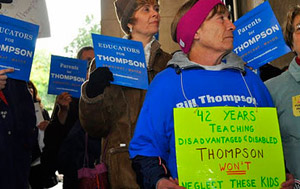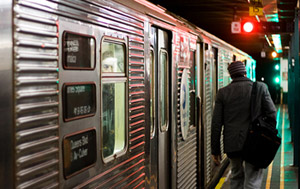
They trade barbs and sling mud.
And believe it or not, sometimes they exaggerate.
We went through some of the accusations thrown by the city's mayoral candidates, Mayor Michael Bloomberg and Comptroller Bill Thompson, to find out the fact -- and fiction -- behind the rhetoric.
This email address is being protected from spambots. You need JavaScript enabled to view it. more accusations you hear on the campaign trail, and Gotham Gazette will look into them between now and Election Day.
AN EDUCATION RECORD
Claim: The Bloomberg campaign says, as school board president, Thompson presided over low performance and waste. Meanwhile under the mayor's tenure, test scores are up, school violence is down and $350 million has been cut from bureaucracy and put in the classroom.
FACTS: The mayor is definitely right about one thing: Test scores are climbing, according to the Department of Education, and fast. Between 2002 and 2009, the number of fourth grade students who met or exceeded state standards in math went from about 52 percent to 84.9 percent, according to statistics provided by the city's education department. In 2002, less than 30 percent of eighth graders met state standards in reading. In 2009, 57 percent made the grade. Whether the rise is because of easier tests, the mayor's changes to the school system or something else entirely remains unclear.
The statistics also improved under Thompson's tenure as president of the Board of Education -- granted far more slowly. From 1999 to 2001, the years the city used the state exam while Thompson was president of the Board of Education, the percentage of fourth graders who met state math standards went from 49.6 to 51.8 percent. For reading, fourth graders who met state standards increased from 32.7 percent to 43.9 percent. According to the city's Department of Education, the percentage of eighth graders who met reading standards dropped from 1999 to 2001 -- from 35.2 percent to 33 percent.
Keep in mind: Thompson did not control the schools as school board chief -- he shared that with the mayor, the chancellor and the other board members -- making it difficult to attribute student success or failure to his actions. From 1996 to 2001, the years Thompson was president, high school graduation rates went from 48 percent to 51 percent.
During Bloomberg's tenure, graduation rates have climbed from 51 percent to 66 percent, according to the Department of Education.

MAYORAL CONTROL
Claim: Thompson says his record as president of the Board of Education led to mayoral control.
FACTS: According to at least one colleague at the Board of Education under Thompson's reign, his actions did help move the city's school system toward mayoral control. "His efforts were precursors to mayoral control. He played a leading role in governance changes," Sandra Lerner, a former board member from the Bronx, told Gotham Gazette earlier this year. While in the post, Thompson advocated for mandatory school uniforms and a chancellor's district for low performing schools. He was thought of as a conciliator. At the same time, in 1996, just before he took over the board presidency, Thompson told the New York Times he opposed giving then Mayor Rudolph Giuliani control over the school system. He has since said he supports mayoral control.
BLOOMBERG'S RECORD ON TRANSPORTATION

Claim: Bloomberg says in a third term, he will bring New Yorkers the subway and bus service they deserve.
FACTS: Bloomberg says now that he wants to crack down on the Metropolitan Transportation Authority. But if his record is any indication of his commitment to the authority, voters might have reason for skepticism. During his eight years in office, according to a report by the Independent Budget Office, the city's financial contribution to the transportation authority has remained relatively stagnant -- even while the city had serious surpluses.
In addition, every transit proposal the mayor released in August -- a plan that calls for free crosstown buses and an express F line -- would need approval from the Metropolitan Transportation Authority's board where the mayor has only four of 14 votes. Some of these ideas, like countdown clocks in stations, are already being implemented by the authority. Others would be next to impossible to implement in the next four years. For one, the F line express train Bloomberg has called for cannot even be considered until rehabilitation of that line is completed. According to an authority spokesperson, that rehab is scheduled for completion in 2014 -- after the end of a potential third term for Bloomberg.
The authority, according to a spokesman, has not done any cost estimates on the mayor's proposals. But earlier this year, the Metropolitan Transportation Authority got a state bailout because of its dire fiscal straits. The mayor's campaign office says his transportation plan identifies $247 million in savings for the authority.
HOMELESSNESS
Claim: Thompson says under the Bloomberg administration the city has seen record high numbers of homeless individuals.
FACTS: Though the mayor said in the city's first general election mayoral debate that the city's homeless situation is "better" than when he first came to office, the numbers say otherwise. According to a new report from the Coalition for the Homeless, a citywide advocacy group, 39,000 individuals and 10,000 families are in city shelters every night -- a 45 percent increase from when the mayor first took office.
A SAFER CITY
Claim: Mike Bloomberg has brought crime to record lows in NYC.
FACTS: The Giuliani administration gets a major part of the credit for reducing the city's rampant crime rate of the 1980s. For instance, the largest drop in crime, according to annual statistics from the police department, was between 1990 and 1995, when the number of major crimes dropped from 527,257 to 312,332. Nonetheless, the Bloomberg administration has continued that trend even during the recession. Under the mayor's watch, major crime, including rapes, homicides and burglaries, have declined from 162,064 in 2001 to 117,840 in 2008, according to the police department, making New York City the country's safest large city.
A CITY OF FEES
Claim: New Yorkers are crippled by fees under Bloomberg, according to the Thompson campaign.
FACTS: Between fiscal year 2005 and fiscal year 2009, the number of parking summonses issued went up by 12.4 percent (more than 10.6 million were handed out in fiscal year 2009). The number of violations issued by the city's Department of Environmental Protection, covering loud music past 11 p.m., went up by about 70 percent, according to the mayor's management report. Some say these increases represent the administration's policy to ticket to create revenue.
Elsewhere, water rates have skyrocketed by a little more than 93 percent -- attributed mostly to unpaid bills and years of lax enforcement by the city. And to close a budget gap, parking meter rates went to 75 cents for an hour from 50 cents this year (most meter rates have been unchanged since 1992).
Thompson, not surprisingly, blames Bloomberg. But during the city's last fiscal crisis in 2002, Thompson too encouraged the city ramp up its fee collections. According to testimony before the City Council in January of 2003, Thompson said, "I have instructed my staff to work aggressively to identify uncollected revenue that will help the city in these difficult fiscal times. It is particularly important that the Department of Finance, as the primary agent responsible for collecting fines and penalties due to the City, maximize its efforts."
LETTING CAMPAIGN CONTRIBUTIONS INFLUENCE PENSION INVESTMENTS
Claim: Bloomberg's campaign says the city's pension funds underperform others, because Thompson has engaged in pay to play politics by accepting political contributions from those that do business with the city's pension funds.
FACTS: At a Crain's breakfast forum last week, Bloomberg said again there was no reason for pension managers in California to give to Thompson's campaign unless they expected something in return. According to the New York Times, Thompson has received more than $500,000 since 2001 from money managers associated with the city's pension system. At the same time, according to the Times, the city's pension funds have underperformed -- below the median of 4.5 percent in returns for four of the five public pension funds (under Thompson's predecessor, returns were more than 12 percent). The Daily News reported the comptroller received $158,000 in campaign contributions from those who do business with the pension funds.
The Bloomberg campaign has consistently alleged this amounts to pay to play politics. But none of these reports have made the direct connection that Thompson has received a quid pro quo -- campaign donations for pension contracts. At the same time, Bloomberg is obviously exempt from this particular type of criticism because he is self-financed. Thompson, though, has alleged Bloomberg silences critics through his philanthropic donations -- an allegation that also has not been proved.
No formal complaint has been filed by the Bloomberg campaign against Thompson alleging conflicts of interest.
A RICHER CITY
Claim: Thompson says the Bloomberg years have been rife with "giving to developers and Wall Street" and the middle class is being squeezed out.
FACTS: In 2002, the city gave out $1.7 billion in tax benefits to the real estate industry. In 2009, according the city's Department of Finance, that number grew to $3.7 billion. Over the Bloomberg years, the controversial 421-a tax benefit alone grew from $130 million to $607 million. Sure, more people were building -- but certainly developers are benefiting.
These stats lead Thompson to charge massive development has battered the city's middle class, and a report from the Center for an Urban Future backs him up. Between 2004 and 2005, 12,955 New Yorkers with bachelor's degrees left the city. Between 2005 and 2006, 29,370 left. The report also notes that in 2006, the city lost 151,441 people to other U.S. cities.
On the other hand, according to the city's housing vacancy survey, the median income for renter households in 2007 was $36,200, a very slight increase from $36,000 in 2004.





